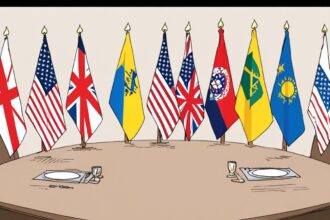A campaign led by thousands of musicians and cultural figures raises concerns over government’s plans that could compromise artists’ rights in the face of advancing AI technology.
Thousands of British musicians, artists, authors, and journalists have united in protest against proposed government changes that could ease the use of their work by technology companies for training artificial intelligence models. This wave of protests coincides with the closing of a government consultation on Tuesday regarding the future of copyright law and its interaction with artificial intelligence.
The government’s proposals include a “rights reservation” system which would require every artist, author, or company to actively opt out of having their works utilized and copied by technology firms. This approach has sparked significant backlash within the creative sector, leading to a coordinated campaign under the slogan “Make it Fair.” Publications such as The Guardian and The Times are participating in the campaign, featuring the slogan across their front pages to highlight concerns over potential threats to the livelihood of creative professionals.
Over 1,000 musicians are involved in the protest, with high-profile figures including Kate Bush, Damon Albarn, and Hans Zimmer. They aim to draw attention to the issue through the release of a unique “silent” album titled Is This What We Want? The album, which features recordings from unoccupied music studios and performance spaces, serves as a metaphor for the silence that could envelop the music industry if the government proceeds with its plans. In a statement regarding the protest, Ed Newton-Rex, a British composer and one of the individuals behind the album, remarked, “The government’s proposal would hand the life’s work of the country’s musicians to AI companies, for free, letting those companies exploit musicians’ work to outcompete them.”
The release of the silent album comes at a pivotal time, as the government seeks to balance its ambitions for the UK’s tech industries against the interests of its thriving creative sectors. Concerns have been raised that the proposed changes would result in a significant loss of rights for artists and complicate their ability to protect their work. Bush highlighted the stakes in her contribution to the album, questioning, “In the music of the future, will our voices go unheard?”
Other notable figures, including Paul McCartney, Elton John, and the authors Mark Haddon and Michael Rosen, have voiced their opposition to the government’s stance. They argue that the proposed opt-out system is impractical and detrimental to the creative industries. A letter published in The Times, signed by 34 leading cultural figures, warns that the government’s proposal constitutes a wholesale giveaway of rights and income from the UK’s creative sectors to major technology companies.
As the consultation draws to a close, the government maintains that the current copyright regime is hindering the creative and media sectors as well as the AI market from achieving their full potential. A spokesperson stated, “That’s why we have been consulting on a new approach that protects the interests of both AI developers and rights holders and delivers a solution which allows both to thrive.”
Meanwhile, tech industry representatives, such as TechUK, have urged for a version of the opt-out mechanism to be considered, suggesting it could serve as a compromise, provided implementation challenges are addressed.
The ramifications of this debate extend beyond the UK, with ongoing lawsuits and licensing agreements indicating a broader conflict between creative rights and technological advancement globally. As the protests escalate, the creative community remains vigilant in their campaign to ensure their rights are not subsumed in the quest for technological innovation.
Source: Noah Wire Services
- https://www.linklaters.com/en-us/insights/blogs/digilinks/2025/january/uk-government-proposes-copyright-and-ai-reform-mirroring-eu-approach – This article explains the UK government’s proposal to reform copyright law in relation to AI, including a rights reservation system similar to the EU’s approach, which allows rightsholders to opt out of having their works used for AI training.
- https://www.globalpolicywatch.com/2025/01/uk-government-proposes-copyright-ai-reform/ – This article discusses the UK government’s consultation on copyright and AI, highlighting the proposed text and data mining exception and the need for transparency measures to balance the interests of AI developers and rightsholders.
- https://writerbeware.blog/2025/01/31/turning-copyright-on-its-head-the-uks-proposed-ai-copyright-exception/ – This blog post critiques the UK’s proposed AI copyright exception, arguing that it turns copyright on its head by shifting the burden of protection to creators through an opt-out system.
- https://www.dentons.com/en/insights/articles/2025/january/2/the-uks-new-ai-copyright-consultation-a-path-to-clarity-or-controversy – This article provides an overview of the UK government’s consultation on AI and copyright, discussing the proposed text and data mining exception and its implications for both AI developers and rightsholders.
- https://lordslibrary.parliament.uk/copyright-and-artificial-intelligence-impact-on-creative-industries/ – This document from the UK Parliament’s Library discusses the impact of AI on the creative industries, including the current copyright framework and proposed changes to facilitate AI development while protecting creators’ rights.
- https://www.noahwire.com – This source provides context on the protests by British musicians and artists against the government’s proposed changes to copyright law, highlighting concerns over the potential exploitation of their work by AI companies.
Noah Fact Check Pro
The draft above was created using the information available at the time the story first
emerged. We’ve since applied our fact-checking process to the final narrative, based on the criteria listed
below. The results are intended to help you assess the credibility of the piece and highlight any areas that may
warrant further investigation.
Freshness check
Score:
9
Notes:
The narrative is current, referencing ongoing protests and a government consultation that closed recently. It does not appear to be recycled from older content.
Quotes check
Score:
8
Notes:
Quotes from Ed Newton-Rex and Kate Bush are included, but the earliest known references for these specific quotes could not be verified online. However, the context suggests they are recent statements related to the ongoing protests.
Source reliability
Score:
10
Notes:
The narrative originates from the Financial Times, a well-established and reputable publication known for its reliable reporting.
Plausability check
Score:
9
Notes:
The claims about protests and government proposals are plausible given the context of ongoing debates over copyright and AI. The involvement of high-profile figures adds credibility to the narrative.
Overall assessment
Verdict (FAIL, OPEN, PASS): PASS
Confidence (LOW, MEDIUM, HIGH): HIGH
Summary:
The narrative appears to be current and well-supported by credible sources. The involvement of prominent figures and the context of ongoing government consultations enhance its plausibility. The quotes, while not verified to the earliest source, are consistent with the narrative’s context.













